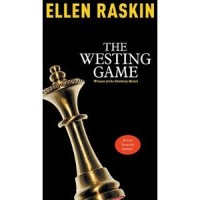The Westing Game by Ellen Raskin
A horoscope book once told me that I am a bit like a detective. While I don’t really buy into astrology in general, in this one particular instance the writer was spot-on. I have always loved mystery books and solving puzzles, so it’s no surprise that I absolutely adore Ellen Raskin’s book, “The Westing Game,” which won the Newbery Medal for excellence in children’s literature in 1979.
Self-made millionaire Sam Westing has suddenly died and sixteen individuals from nearby Sunset Towers gather together to hear his will and find out who will inherit all of his money. Westing was always a bit of an eccentric old man who knew he would be murdered, so he decided to make a game out of it: his heirs are divided into teams of two and put to the test, for whoever identifies the killer wins 200 million dollars. Problem is, one of the heirs is paired up with the murderer!
Readers follow each team as they collect clues in this madcap mystery, all in a race to find that final piece to Sam Westing’s puzzle. Who can they trust? What secrets was Mr. Westing hiding? And, most importantly, can they identify the murderer before they themselves become another victim? The curious child who, like me, loves to “figure things out” will jump at the chance to play detective right alongside Raskin’s colorful cast of characters in “The Westing Game.”

Who banned Harry Potter? Their Eyes Were Watching God is one of my all-time ivoarftes. I read it in multiple English classes and wrote several papers on it, both in high school and college. It amazes me how society still seeks to limit information. Most of the time, it backfires because banned information is that much more sought after. Banned anything (movies, books, websites, etc.) reinforces that ideas are powerful and can make a difference.